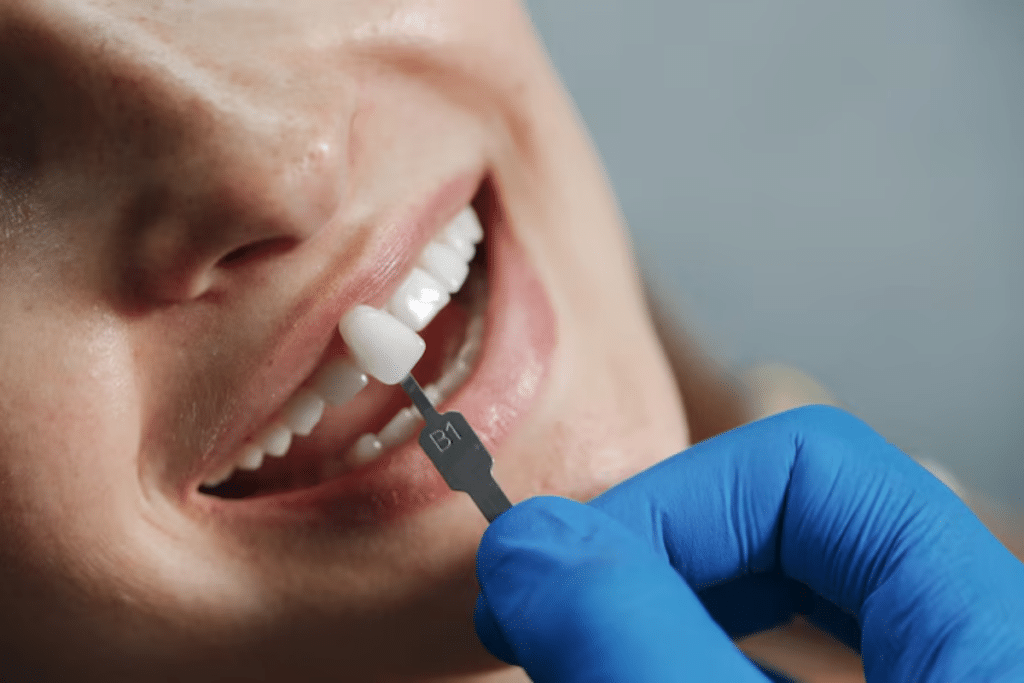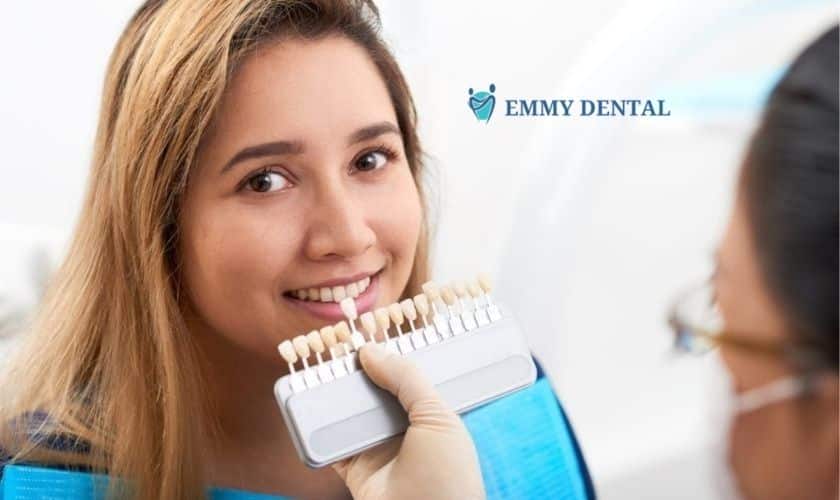
How To Properly Care For Porcelain Veneers: Tips and Tricks
Porcelain veneers are a popular cosmetic dental solution for those looking to enhance their smile. These thin, custom-made shells are designed to cover the front surface of your teeth, providing a natural and attractive appearance. While porcelain veneers are durable and stain-resistant, proper care is essential to maintain their beauty and longevity. In this blog post, we’ll explore the best tips and tricks for caring for your porcelain veneers to ensure they last for years to come.

1. Maintain a Consistent Oral Hygiene Routine
Just like your natural teeth, porcelain veneers require a consistent oral hygiene routine to stay in top condition. Although veneers themselves don’t decay, the underlying teeth and gums are still vulnerable to plaque buildup and potential issues like gum disease.
Brushing: Use a soft-bristled toothbrush to brush your teeth twice a day. Soft bristles are gentle on your veneers and won’t cause scratches or wear on the porcelain surface. Opt for a non-abrasive toothpaste, as abrasive toothpaste can damage the veneer’s surface over time.
Flossing: Flossing is equally important as brushing. Carefully floss between your teeth at least once a day to remove plaque and food particles that can accumulate around the edges of your veneers. Consider using a floss threader or an interdental brush if you find it challenging to maneuver regular floss around your veneers.
Mouthwash: Rinsing with an alcohol-free mouthwash can help kill bacteria and freshen your breath without drying out your mouth or damaging the adhesive bond of your veneers. Alcohol-based mouthwashes can weaken the bond, leading to potential issues with your veneers.
2. Avoid Foods and Habits That Can Damage Veneers
While porcelain veneers are strong and resilient, they are not invincible. Certain foods and habits can put undue stress on your veneers, leading to chipping, cracking, or even dislodging them.
Hard Foods: Avoid biting into hard foods like ice, nuts, or hard candies. These can cause your veneers to crack or chip. If you enjoy these foods, consider breaking them into smaller pieces and chewing with your back teeth to minimize the risk.
Sticky Foods: Sticky foods like caramel, chewing gum, or taffy can pull at your veneers, potentially loosening them. It’s best to avoid these types of foods altogether to protect your veneers.
Staining Foods and Beverages: While porcelain veneers are more stain-resistant than natural teeth, the edges where the veneer meets the natural tooth can still stain over time. Limit your consumption of staining foods and beverages like coffee, red wine, tea, and berries. If you do indulge, rinse your mouth with water afterward to help reduce the risk of staining.
Bad Habits: Habits like nail-biting, chewing on pens or pencils, or using your teeth as tools can cause damage to your veneers. Be mindful of these habits and try to break them to protect your veneers.
3. Regular Dental Check-ups and Professional Cleanings
Regular dental check-ups are essential for maintaining the health of your teeth, gums, and porcelain veneers. During these visits, your dentist will check the condition of your veneers, the health of your underlying teeth, and your overall oral health.
Dental Exams: Schedule dental exams every six months or as recommended by your dentist. These exams allow your dentist to detect any potential issues early on, such as decay around the edges of the veneers or gum disease. Early detection and intervention can help prevent more significant problems and ensure the longevity of your veneers.
Professional Cleanings: Professional cleanings are vital for removing plaque and tartar buildup that regular brushing and flossing might miss. Your dental hygienist will use specialized tools and techniques to clean your veneers without damaging them. These cleanings also help maintain the natural luster of your veneers.
Communicate with Your Dentist: If you notice any changes in your veneers, such as rough edges, chips, or discomfort, don’t hesitate to contact your dentist. Prompt attention to these issues can prevent more extensive damage and prolong the life of your veneers.
4. Wear a Nightguard if You Grind Your Teeth
Bruxism, or teeth grinding, is a common issue that can cause significant damage to your porcelain veneers. Grinding your teeth puts excessive pressure on the veneers, leading to chips, cracks, or even dislodging them.
Nightguards: If you grind your teeth at night, your dentist may recommend a custom-made nightguard. This protective appliance is worn over your teeth while you sleep and acts as a barrier to prevent your upper and lower teeth from grinding against each other. Nightguards are made from durable materials and are designed to fit comfortably in your mouth, ensuring you can sleep soundly while protecting your veneers.
Daytime Bruxism: Some people grind their teeth during the day as well, often due to stress or anxiety. If you find yourself clenching or grinding your teeth during the day, try to become more aware of the habit and take steps to relax your jaw muscles. Stress-reduction techniques like deep breathing, meditation, or exercise can help reduce daytime bruxism.
5. Mind Your Oral Health with a Balanced Diet
A balanced diet plays a significant role in maintaining your overall oral health, which in turn, affects the longevity of your porcelain veneers. Eating a diet rich in vitamins, minerals, and other nutrients can strengthen your teeth and gums, providing a healthy foundation for your veneers.
Calcium: Calcium is essential for strong teeth and bones. Incorporate calcium-rich foods like dairy products, leafy greens, and almonds into your diet to support the health of your natural teeth and the underlying structure of your veneers.
Vitamin D: Vitamin D helps your body absorb calcium more effectively. Sun exposure, fatty fish, and fortified foods are excellent sources of vitamin D.
Vitamin C: Vitamin C is crucial for gum health. Foods like citrus fruits, berries, and bell peppers are rich in vitamin C and can help keep your gums healthy and prevent gum disease, which could compromise the stability of your veneers.
Hydration: Staying hydrated is important for maintaining saliva production, which helps wash away food particles and bacteria that can lead to decay and gum disease. Drink plenty of water throughout the day to keep your mouth healthy.
Limit Sugary Foods: Sugar contributes to plaque buildup, which can lead to decay around the edges of your veneers. Limit your intake of sugary foods and beverages, and be sure to brush and floss thoroughly if you do indulge.
Porcelain veneers are an investment in your smile, and proper care is essential to protect that investment. By maintaining a consistent oral hygiene routine, avoiding harmful foods and habits, attending regular dental check-ups, wearing a nightguard if necessary, and following a balanced diet, you can keep your veneers looking beautiful for years to come.
Remember, your veneers are a reflection of your overall oral health, so take the time to care for them properly. With these tips and tricks, you can enjoy a stunning, confident smile for many years.


